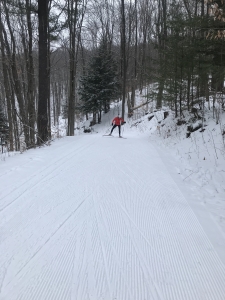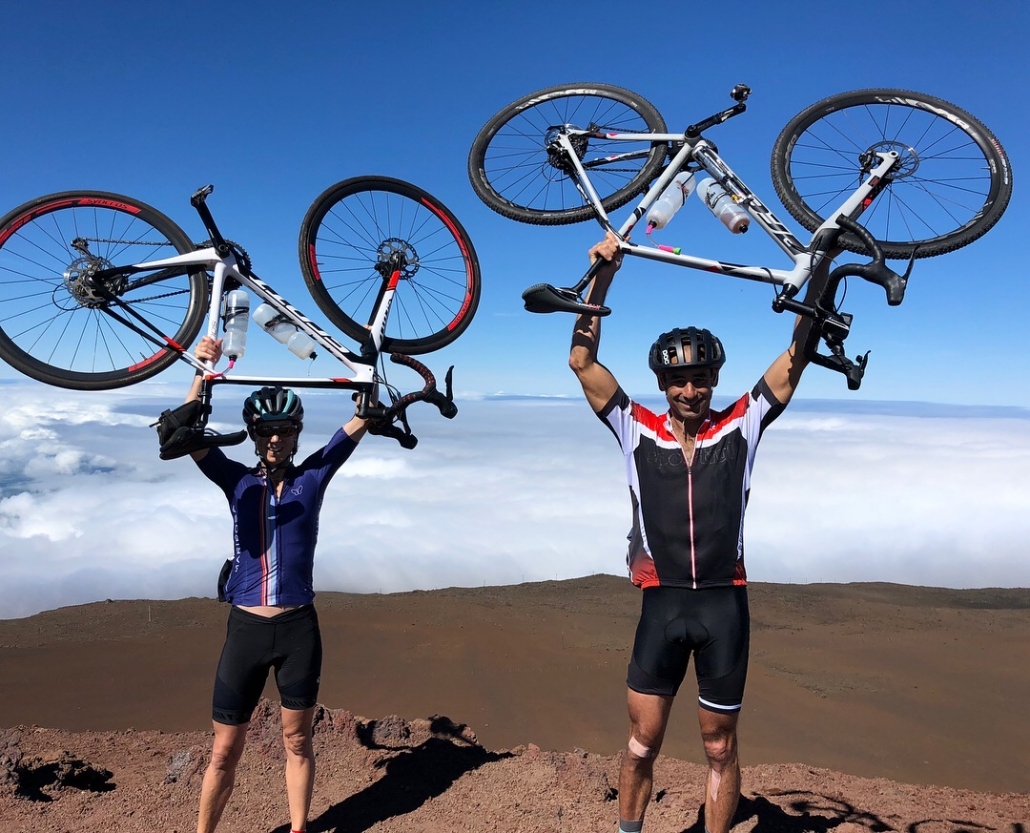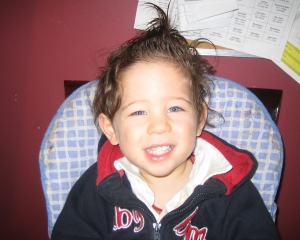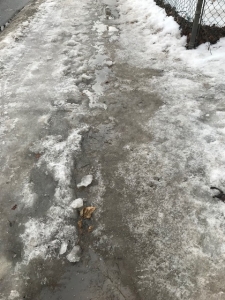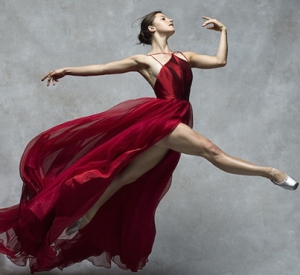I leave the group of parents I chat with in the mornings at the school after dropping our kids off and start heading west. I’m in my immediate neighbourhood for the first couple of blocks, so often see familiar faces and friends and we wave and say hi. Once I cross the bridge over the Don River though, I’m no longer in what I would consider my neighbourhood. If it was cold out and I was trying to get home from here, I might even hop on the streetcar instead of walk. But today I’m running. I run to my volunteer job 7km away every Tuesday morning. I run from the east side of the city to the west side along what must be the busiest street in the country – Queen Street.
I’m neither in a rush, nor do I dawdle. I’m just running as a simple way to get where I need to go. It takes me about 35-40 minutes depending on the lights I either race to catch or slow down to meet the red and get a break. I pass people walking, riding bikes, lying on grates, sleeping in doorways, driving in cars, riding in streetcars, but I’m the only one running. I’m moving at a different pace than everyone else, and this places me in my own world of observation. Pedestrians don’t interact with me, car, bike and transit traffic don’t interact with me, even the people living on the streets who are either still up or already up don’t give me a second glance.
I always run on the south side of the street. I pass all my familiar sights. I look for the man who sleeps on the lawn of St. Paul’s Basilica. I like to make sure he’s there because I would worry if he wasn’t. He’s usually still asleep when I pass by at 9 am and nowhere to be seen when I come back a few hours later. I wonder where he goes. As I move a little further away from my neighbourhood the scene and people change quickly. This is what would be considered a rough part of town. I think my neighbourhood was very similar about 15 years ago, but gentrification has pushed those who can’t keep up over here. A woman walks by wearing nothing on her bottom. I am wearing full length running tights and she isn’t even wearing underwear. I feel I should do something but I have no idea what. I quickly pass her and after a few glances back to make sure of what I’m not sure, I run on. I pass the All Saints Church-Community Centre. There is always a handful of people hanging out outside, smoking or chatting or starting their day. In the winter they never look like they’re wearing enough. I sometimes try to make eye contact or smile, but I am invisible to them. I am running by. Too quickly for anyone to react or to reach out in any significant way.
The next few blocks are usually pretty open for me to run on the sidewalks. There’s not a lot of pedestrian activity. The cars, streetcars and bikes pass me though. Although sometimes because of traffic I’m passing them. We are all headed towards the central hub of activity: downtown Toronto. By the time I reach St. Michael’s Hospital, just before Yonge St, I am dodging people all along the sidewalk. Now I have to tune in and pay attention because everyone is walking somewhere busily, most people are staring down at their phones, and no one expects a runner to be passing by. Everyone walking around here is dressed sharply. When I stop at a light and stand in the throng, I am a marked contrast in my running gear. This district has been awake and buzzing for a couple of hours already. Some of these people are probably out for their mid-morning coffee break while others are still hustling in.
The grates in this area are in high demand for homeless sleepers. They are warm and probably present a better chance at receiving a handout than a beating. I always observe who is sleeping where. They are usually still sound asleep at 9 a.m. One time I passed the man sleeping on the grate near Bay St. and his jeans were ripped right down the middle and everything was exposed. I should have stopped and found a blanket to place over him. It’s such an amazing contrast to see these two worlds occupying the same space, completely seemingly oblivious to one another. I feel like an outsider to both so I just observe and run on.
As I move away from the downtown core I am now swimming upstream against the pedestrian traffic all trying to go to the same place. I often have to stop to let people by, or on and off the streetcars. This shakes out quickly though. By the time I pass University Avenue the fast walking business types have mostly cleared the sidewalks. I run west towards Spadina and find my eyes drawn to the store displays in the shop windows. Many of these stores rely on street traffic for business, and so like birds during mating season, have to make themselves more beautiful and attractive than their rivals. My neighbourhood does not have row upon row of this retail eye candy. I have not built up any defences and I ogle them all. But luckily I am running, so I can’t stop and go in “just to try one thing on”. The people I pass along this stretch often have either a dog or a stroller. They are also dressed just a little more edgily than in my neighbourhood. I like to think they’re artists or musicians. Quite a few of the entryways to the shops which aren’t open yet have one or two people finishing off their nights’ sleep covered in blankets and sleeping bags and usually a dog or two. There is not one stretch along this street where peoples’ struggles haven’t been apparent. Maybe when you’re walking you have to avert your eyes because you don’t want to get involved. And when you’re on the road, you literally don’t see them. But running, I can look, absorb, and move on. I have passed by before anyone who’s not looking for me has noticed me.
I’m now getting closer to my destination. The store fronts are now independently owned funky stores, not big brand names. Coffee shops have dogs parked outside. I can tune out and run in a straight line – there is no dodging people here. There are fewer pedestrians and the ones who are out are more relaxed. No one is wearing a suit. The drivers are still angry though. I hear many horns and tire screeches. Sometimes I look back, just to see if the altercation intensifies and turns into something bad. Thankfully, most of the time it doesn’t. My attention floats back to my world on the sidewalk.
As I reach the hospital where I volunteer, I slow to a walk. Now I re-enter the same space inhabited by others. We’re moving at the same pace. We make eye contact, we acknowledge each others’ presence. We exchange words or smiles. I’m visible again. Until my commute home.


